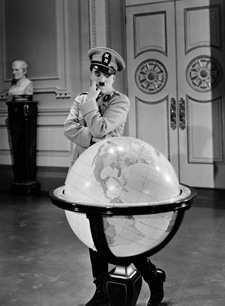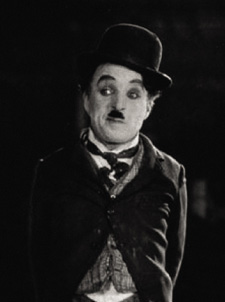
OCTOBER 2005
Middle East lessons from Charlie
Chaplin
By Sami
Moubayed, Special to Gulf News
I once met the journalist
Nihad Al Ghadri, a one-time dissident and current
ally  of the Syrian
Baath party. His son, Fareed, is the founder and
president of the Party of Syrian Reform, a
US-based and funded Syrian opposition group. of the Syrian
Baath party. His son, Fareed, is the founder and
president of the Party of Syrian Reform, a
US-based and funded Syrian opposition group. Fareed Al Ghadri is being groomed by some wishful hawks in the White House as the leader of the Syrian opposition in the United States. Despite his connections in Washington, he is a political nobody in Syria, unheard of and rejected by Syrians because he wants normalisation of ties with Israel, is funded by the Americans, and advocates US military intervention in Syria. Father and son had fallen out with one another over politics and when mentioning Fareed, Nihad said that his son was being used by the United States. Ghadri Senior added that his son was so distant from Syrian affairs "that he thinks Aleppo is located in Sudan!" We talked about what is more amusing, being an actor on the political stage of Syria or being a member of the audience, as he had been since the 1940s. Ghadri said that the audience seat is more amusing, since it endures longer, whereas the actor is often replaced and forgotten. Heroes rise and heroes fall, and they are forgotten in the world we live in, not only in Syria, but throughout the Arab world. Why then, would someone like Fareed strive to become a figure in Syria a country he left when he was a teenager and can barely remember? Iron fist The same applies to Rifaat Al Assad, who declared in May 2005 that he will return to Syria to restore "freedom and democracy". This is the same man who ruled Syria with an iron fist between 1970-1982. Isn't it more advisable for someone like Rifaat, who has been in retirement for so long and who, apart from his entourage, is not popular in Syria, to remain a member of the audience? Recently, ex-Syrian President Ameen Al Hafez returned to Syria after nearly four decades in exile in Saddam Hussain's Iraq, and found no one waiting to greet him on the Syrian-Iraqi border. The crowds that cheered for him when he was president between 1963-1966 were not there. In fact, only then did he realise that they never really existed. Hafez was an unpopular leader, imposed on Syrians, rather than elected by them. When he was toppled and arrested in 1966, not one person spoke out in his defence. When he was exiled in 1967, not one person saw him off at the airport. And now, he returned after 36 years in exile, and nobody was there to welcome him. In December 2003, Saddam also showed up after eight months in hiding looking like a miserable, helpless and homeless tramp. Another leader, cursed by the lust for power, hated and feared by his own people, had fallen. This is a curse we face in the Middle East, and falls upon many of our leaders and must be remembered by someone with Fareed's or Rifaat's ambitions. Arabs in general do not like imposed leaders but they have been forced to live with them for the better part of the 20th century. Fareed might not come to power through a traditional coup d'etat like the generalissimos of the 1960s, but he would come escorted by the United States. To the masses who still believe in Arab nationalism, he would be no different from Saddam. As pictures of Saddam in his underwear, doing his own washing, made world headlines, I could not help wonder what was going through this man's evil and distorted mind. Was he sorry he had become an actor and not stayed with the audience? Was he feeling guilty for all the bloodshed he had caused? Was he regretful he had not accepted the American warning in early 2003 and flown into exile, either in Russia, France or Egypt? By doing so, he would have avoided this fate for himself and his family, and prevented the war against Iraq. Was he preparing himself for a lifetime in prison or execution or was he fantasising about how to escape and seize power from the Americans? Ludicrous as it is, the last option is probably what is going through his sick mind, since he remains, from his remarks in court, obsessed with power. I feel for the institution of the presidency in Iraq, that Saddam ruined while in power, and continues to tarnish today in captivity. Saddam came to power in 1979 and ruled until 2003, making his own name and image synonymous with Iraq. In his own mind, and in the mind of millions of Arabs, here was Iraq today, occupied, in jail, in hiding, living the life of an outlaw, then arrested, clamped in chains, pictured in humiliation, and standing trial. Iraq is not Saddam Hussain. Iraq cannot, and will not, be summarised by the image of one evil man. The era of Saddam is gone, and the Middle East will never be the same without him. It might not become better, but it certainly will not become worse. After so much horror under his regime, the Iraqis have no place left to go but up. Let us hope, however, that the Arabs learn a lesson from Iraq 1979-2003, to never let a brute a man who fears human progress, control them. At the end of the day, dictators die, or fall with a thunder like Saddam. And so long as men die, the Middle East will live the life its people deserve. In wrapping up this article, I could not help but remember a classical speech by Charlie Chaplin, from his film The Great Dictator. Role
model Chaplin was the kind of man we need today in the Arab world innovative, unafraid to say courageous things through art, be persecuted for them, and to let the human mind defend or discard his views. He made The Great Dictator in the middle of the Second World War, when Hitler was at his peak. Chaplin's words should echo in the minds of Arabs like Fareed and Rifaat who want to shift places from that of the audience to that of the actor. Or men like Saddam, who have played the actor for too long, and are now, seated among the audience. In the film, a barber who is a Hitler look-alike finds himself dressed in Hitler's uniform and given a golden opportunity to address the people of the world right before a military invasion. Instead of talking military might, he gives a wonderful speech on democracy. "Soldiers, don't give yourself to brutes, men who despise you and enslave you, who regiment your lives, tell you what to do, what to think, and what to feel, who drill you, diet you, treat you as cattle, as cannon fire. "Don't give yourself to these unnatural men, machine men, with machine minds and machine hearts. You are not machines, you are not cattle you are men! You have the love of humanity in your hearts. Soldiers don't fight for slavery, fight for liberty!" These words, clear and strong, reached the ears of Hitler in 1941 and should reach the ears of the Arab masses, who deserve democracy, which dictators like Saddam have long deprived them of. Dr Sami Moubayed is a Syrian political analyst |
|||
| © Al Nisr Publishing LLC - Gulf News Online | contact editor@gulfnews.com |
